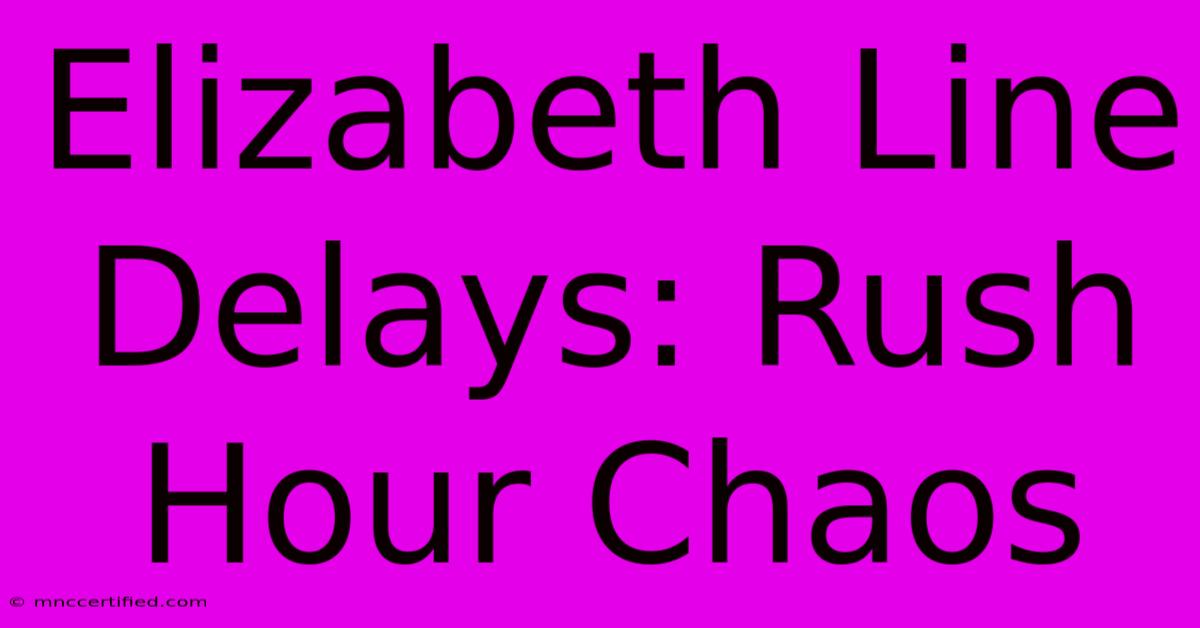Elizabeth Line Delays: Rush Hour Chaos

Table of Contents
Elizabeth Line Delays: Rush Hour Chaos and What Passengers Need to Know
The Elizabeth Line, London's newest and arguably most ambitious railway project, has experienced several frustrating delays causing significant rush hour chaos. While largely lauded for its modern design and efficient service, recent disruptions have left commuters exasperated and questioning the line's reliability. This article delves into the causes of these delays, their impact on passengers, and what Transport for London (TfL) is doing (or should be doing) to address the situation.
Understanding the Causes of Elizabeth Line Delays
Several factors contribute to the recent Elizabeth Line delays, impacting thousands of daily commuters. These include:
1. Signalling System Issues:
The sophisticated signalling system, crucial for the safe and efficient operation of the line, has been a recurring source of problems. Signal failures lead to delays, cancellations, and overcrowding, particularly during peak hours. These failures are often attributed to software glitches or unforeseen technical issues requiring immediate attention and repairs. The complexity of the system makes troubleshooting challenging, leading to extended downtime.
2. Overcrowding and Passenger Flow:
Despite its capacity, the Elizabeth Line has experienced significant overcrowding, especially during peak travel times. This can lead to delays as trains struggle to accommodate all passengers, and platform congestion can further impede service. Efficient passenger flow management is crucial to mitigate these issues.
3. Staff Shortages and Training:
While less frequently reported, potential staff shortages or inadequate training could indirectly contribute to delays. Insufficient staffing may affect the speed of response to incidents, leading to prolonged disruption. Moreover, inadequate training might result in less efficient problem-solving and quicker resolution of issues.
4. Third-Party Incidents:
External factors such as track defects, trespassers, or even severe weather conditions can also cause delays. These unpredictable events are difficult to prevent entirely but require efficient emergency response protocols to minimize disruption.
The Impact on Passengers: Rush Hour Frustration
The consequences of Elizabeth Line delays are far-reaching, impacting commuters' daily routines and well-being.
- Increased Commute Times: Delays translate directly into longer commute times, leading to lost productivity and increased stress levels.
- Missed Appointments and Work Deadlines: The unreliability caused by frequent delays can lead to missed appointments, late arrivals at work, and missed deadlines. This has significant consequences for both employees and employers.
- Overcrowding and Discomfort: Delays often exacerbate overcrowding, leading to uncomfortable and stressful journeys, especially during peak hours.
- Financial Losses: Late arrivals at work might impact earnings, and the added stress can affect overall well-being, leading to potential health problems.
What TfL Needs to Do to Improve the Situation
To regain passenger confidence and ensure smooth operation, TfL needs to take proactive steps:
- Invest in Robust Signalling Systems: Significant investment in robust and reliable signalling systems is crucial. This includes rigorous testing and contingency plans to minimize the impact of future failures.
- Improve Passenger Flow Management: Investing in better crowd control measures, improved station layouts, and real-time passenger information systems is critical.
- Enhance Staff Training and Resources: Adequate training and sufficient staffing are essential for effective incident management and quick resolution of problems.
- Proactive Communication: TfL should improve communication with passengers, providing timely and accurate information about delays and alternative travel options.
Conclusion: The Future of the Elizabeth Line
The Elizabeth Line holds immense potential to revolutionize London's transport system, but addressing the current issues of delays and overcrowding is crucial. By investing in improved infrastructure, refining operational procedures, and prioritizing clear communication, TfL can transform the line into the reliable and efficient service Londoners deserve. The continued success of this vital transport link depends on effectively addressing these challenges and building passenger trust.
Keywords: Elizabeth Line Delays, Rush Hour Chaos, London Transport, TfL, Signalling System, Overcrowding, Commute Times, Passenger Disruption, Train Delays, Transport for London, Elizabeth Line Problems, Elizabeth Line Issues, Railway Delays
Off-Page SEO Strategies:
- Build high-quality backlinks: Reach out to relevant transportation blogs, news websites, and online forums to share the article and potentially gain backlinks.
- Social media promotion: Share the article on relevant social media platforms (Twitter, Facebook, LinkedIn) using relevant hashtags.
- Community engagement: Participate in online discussions and forums related to the Elizabeth Line to build authority and brand awareness.
This comprehensive approach to on-page and off-page SEO will greatly increase the article's chances of ranking highly in Google search results.

Thank you for visiting our website wich cover about Elizabeth Line Delays: Rush Hour Chaos. We hope the information provided has been useful to you. Feel free to contact us if you have any questions or need further assistance. See you next time and dont miss to bookmark.
Featured Posts
-
Russias Ban On Uk Politicians Retaliation For Criticism
Nov 27, 2024
-
Dental Insurance Plans Arizona
Nov 27, 2024
-
Aberdeen Fc Cancels Fan Zone Drinks
Nov 27, 2024
-
Citys 3 0 Lead Vanishes 3 3 Draw
Nov 27, 2024
-
Amtex Insurance San Antonio Tx
Nov 27, 2024